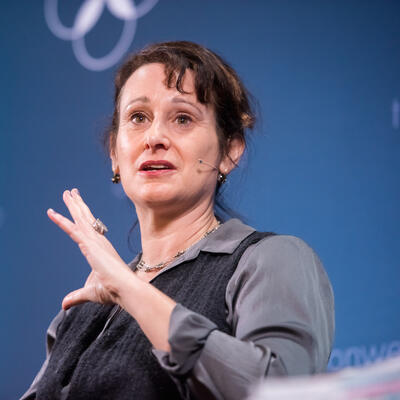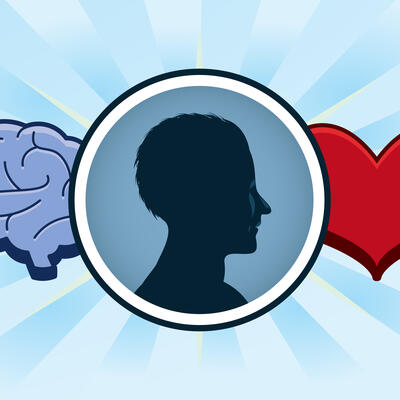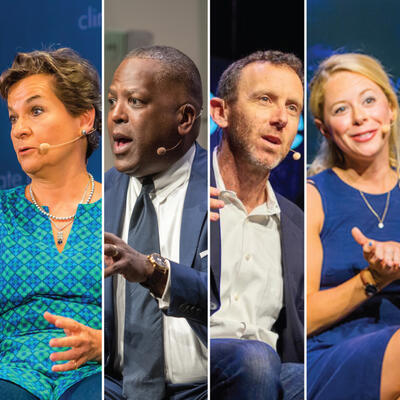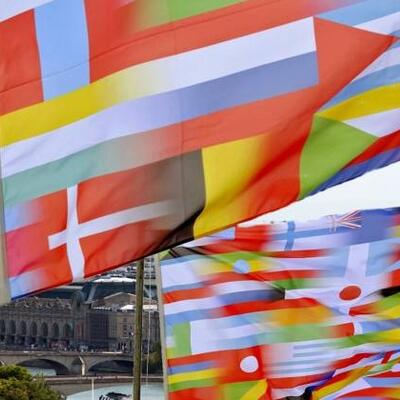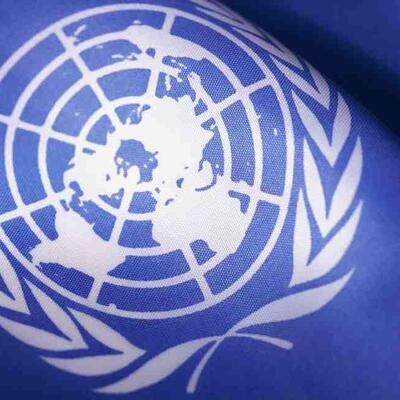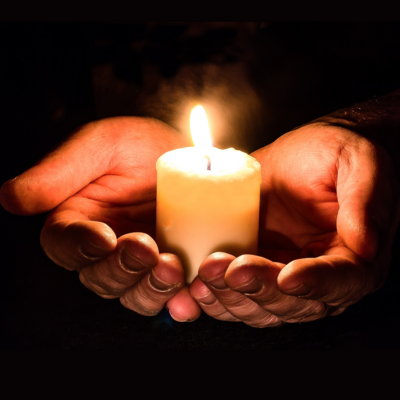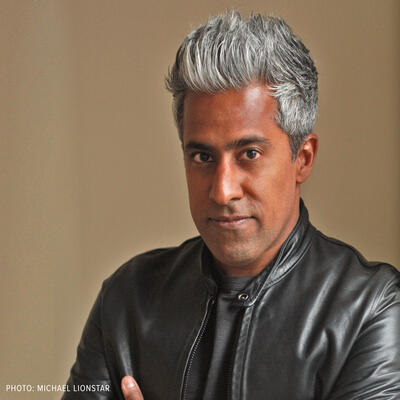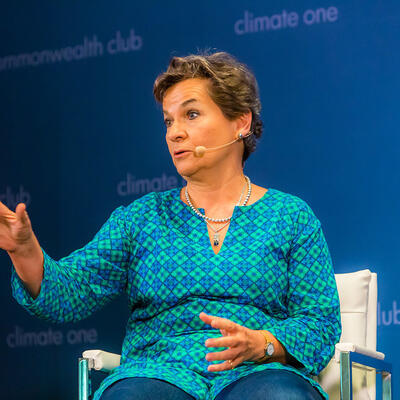
Christiana Figueres: A Conversation on Mindfulness and Climate
Guests
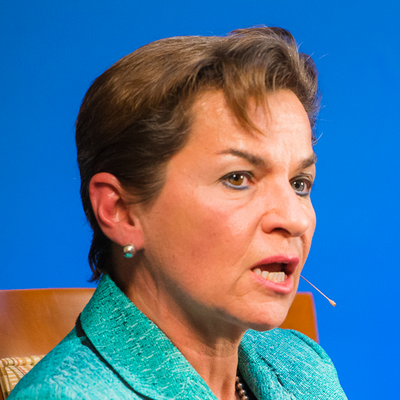
Christiana Figueres
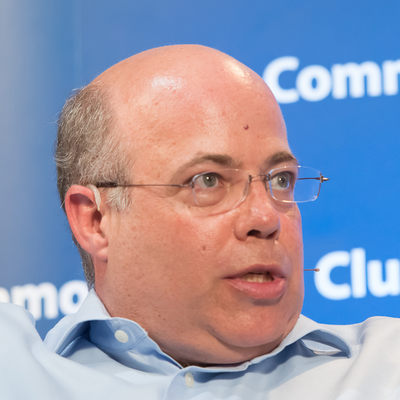
Joshua Freedman
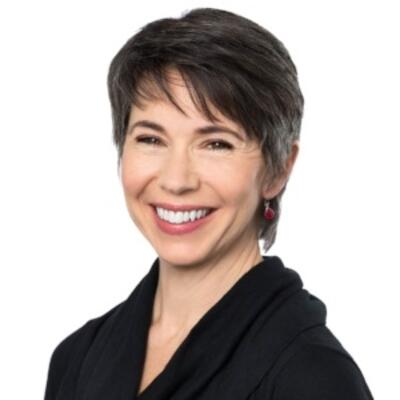
Meg Levie
Summary
Former UN climate negotiator Christiana Figueres credits Buddhist teachings both for helping her through a personal crisis, and for providing a source of inner strength that sustained her through negotiations at the 2015 Paris Climate Accord and helped contribute to its success. “I realized my commitment and my task here is to change that global mood,” Figueres remembers. “And of course I can't change the global mood before I change myself, because as we know all change starts with self.” Can mindfulness practice help us cope with the realities of climate change?
Full Transcript
Announcer: This is Climate One. Today, we’ll hear how Buddhist teachings helped contribute to the success of the Paris Climate Accord.
Christiana Figueres: I realized my commitment and my task here is to change that global mood. And of course I can't change the global mood before I change myself, because as we know all change starts with self.
Announcer: UN Climate Secretary Christiana Figueres shares her story of finding strength and optimism through Buddhist practices. And author Joshua Freedman tells us how staying mindful can help us deal with the realities of climate change.
Joshua Freedman: I think what it means is just as the seas are rising literally, the emotional seas are rising and that means we have to work harder, right. And that's what mindfulness practice is all about.
Announcer: Mindfulness and climate change. Up next on Climate One.
Announcer: The realities of global warming can seem overwhelming. Can changing our mindset help us cope?
Climate One conversations – with oil companies and environmentalists, Republicans and Democrats – are recorded before a live audience, and hosted by Greg Dalton.
After a three-year term as Executive Secretary to the United Nations Framework on Climate Change, Christiana Figueres was exhausted, emotionally drained and ready to pack it in. What kept her going?
Christiana Figueres: Out of nowhere, I have no idea where, the word Buddhism came into my mind. So I’m like, Buddhism. Buddhism? What do you know about Buddhism? I said, nothing. I don’t even know how it’s spelled, but I need it!
Announcer: Figueres credits Buddhist teachings both for helping her through a personal crisis, and for providing a source of inner strength that sustained her through negotiations at the Paris Climate Accord.
Later in the program, Greg further explores the role of mindfulness in climate action with Meg Levie of the San Francisco Zen Center and Joshua Freedman of Six Seconds, the Emotional Intelligence Network. Freedman believes that, rather than letting our emotions make us feel helpless, we can harness them as a hidden source of power.
Josh Freedman: This ability to grow compassion is one of the most powerful things we can do as human beings and it transforms us, it transforms our relationships and ultimately it does transform the world.
First, here’s Greg’s conversation with Christiana Figueres.
Greg Dalton: I vividly remember your predecessor, Yvo de Boer, who led the United Nations Climate Summit negotiations in your position, and he was pretty fried and grizzled at the end of -- it seemed like it had been a long haul for him. You came in and took over that position and then you have been open somewhat about you hit bottom holding literally the weight of the world on your shoulders in this position. Tell us about that experience when you hit bottom and kind of found Buddhism as a way out.
Christiana Figueres: Yeah, I guess there were two different moments. One was just walking into that responsibility and I do remember the first press conference that I had when, you know, we were all still riling from the pain of Copenhagen. And I was asked by a journalist and I had not done my press training so my press team was sitting there, you know, going like, oh my God, what is she gonna say. Because the question was, so Ms. Figueres when do you think we’re ever, you know, do you think we’re ever gonna be able to reach a global agreement?
And the first thing that came out of my mouth was, not in my lifetime.
[Laughter]
Really helpful. And my press team was like frozen over there. Let’s get her some press training. But again, it was a fantastic teachable moment for me, right, because I had actually never thought about that question. I had never thought about the consequences of not having a global agreement. And the moment that it came out of my mouth, I kind of looked at myself, you know, when you have a distance, hold it who is that person who just said that because that is so irresponsible and is so unacceptable. And that’s the moment when I said, right; my commitment here is to change that because I think I had voiced the global mood on climate change. And I realized my commitment and my task here is to change that global mood. And of course I can't change the global mood before I change myself because as we know all change starts with self. So that started off a journey.
Greg Dalton: But a few years into the job you were having a difficult personal time. Tell us about that.
Christiana Figueres: Also, yeah, I mean, everything comes together, right. It’s a wonderful package that life gives you. I shared that moment at Grace Cathedral where the United Nations terms, at least for the climate convention, a three-year term, and at the end of my first term I was asked by the Secretary-General will you do a second one. And I was like, can I think about that because I was having a traumatic situation in my personal life.
I was exhausted from working 27 hours a day, eight days a week. And I just thought, you know, this process really need someone who can come with just incredible strength and renewed vigor. And I was seriously thinking of saying, thank you but, you know, let's find someone else. And as life would have it, my brother and sister who have lived in Costa Rica their whole life expressed their interest in celebrating my sister’s 50th birthday that was August of that year by coming to Europe to see a glacier for the first time in their life. And I thought, wow, that’s so beautiful, right. So I said, my treat, you come up, I will organize the whole thing. So they came over and we went up in the gondola in Austria. We went up in the gondola. And I remember coming to the point in the gondola where you begin to see the top of the mountain and I just totally lost my breath because there was nothing like white. There was no ice. It was a completely brown bare top of the mountain. So, you know, a completely iceless glacier is not what you expect. And the impact was so deep on me that I remember stepping out of the gondola with my brother and sister and just falling to my knees right there and saying this is a lesson learned. It doesn't matter if I’m exhausted. It doesn't matter, you know, if I’m in full pain, I just gotta do it.
So after we got down I called the SG, the Secretary-General, and I said, sir three more years of service, here we go. And sometimes you just really need those knocks, right. You just really need those knocks to understand that we’re not here to just embark on the easy stuff, I mean, honestly, right, how boring would it be if you're just here for the easy stuff. We’re here to engage with the difficult challenges that are given to us and to be able to embrace them with courage, with love, with happiness, with determination and with a vision. And know that, you know, this is something that needs to be changed and it is going to be changed. How exactly, we never know at the beginning. But you’ve got to say this situation is unacceptable. It is morally unacceptable. It is financially stupid. It is environmentally terrifying. It is humanly unacceptable. And we’re gonna change this and honestly in that moment, you know, I don’t know exactly how we were gonna do it, but you just have to set the goal and then go at it and go at it with extreme and deep love for this planet, for all human beings on this planet who all deserve, particularly those who are not here yet. They all deserve and have the right to a life with dignity and a life with happiness and with well-being. And if we do not address climate change in a timely fashion, that’s not gonna happen. So here we are.
Greg Dalton: Thank you for sharing that. And there came a point where--
Christiana Figueres: Tissues are in order.
Greg Dalton: Yes, there you go.
Christiana Figueres: Thank you.
Greg Dalton: We don’t normally have them but thank you for sharing that. And there where you found Buddhism or you say it literally it fell on your lap at a time where you were not sure you could personally go on. You were thinking some really scary thoughts.
Christiana Figueres: Yeah, I guess Buddhism did find me because I was in yet another crisis. I was very seriously considering, you know, well do I stay here or should I actually move to the next life because I'm quite sure whether I can endure this. And so I wrote to -- do we have time for this story?
Greg Dalton: This is a good story. I think this is what the people came for here, how you found Thay, you know.
Christiana Figueres: How I found Thay. So I was in a, you know, just absolute horrible crisis, truly wondering, you know, should I stay here or should I move on, help myself to move on. And I wrote to a friend in Costa Rica, I wrote him an email and I said I’m having a really hard time, I’m having serious suicidal thoughts and I just need to do something. So he writes back and he goes, well so what do you want to do. And out of nowhere, I have no idea where, the word Buddhism came into my mind. So I’m like, Buddhism. And he goes, Buddhism? What do you know about Buddhism? I said nothing. I don’t even know how it’s spelled, but I need it.
[Laughter]
And he goes, okay let me see if I can find something. So he sent me a link
and it was Thay’s monastery in Germany. And it was 45 minutes from my house. And I said, I can do that. And so then I went, you know, engaging with these people who had no idea what was going on but, you know, can I come and I know that it’s full and da da da da. And they said, well first of all, are you man or are you woman. I said, well I'm a woman. Because they separate you, right. And they said, okay that's good. We have one room left if you’re a woman, but it's on the fourth floor and there's no elevator, can you do that? And I said, you know what, I will walk up 20 floors just give me a place to come.
And Thay’s teaching saved my life. They really did. They saved my life. And honestly, they are also the guidance that I used, but that I saw emerging very quickly in how we brought everyone together under the Paris Agreement.
Greg Dalton: Did you share this quiet source of calmness and energy with other people even from Buddhist countries or Asian nations or did you keep it to yourself?
Christiana Figueres: No I kept it to myself because we were working in a very intercultural, interfaith, international space and I did not want the fact that something that had touched me so deeply and had been so meaningful to me to be interpreted as an imposition on anyone else. I mean, this was good for me but everyone who was there was being helped by something else. So it was certainly my guidance and the light in my life, but it didn't have to be everybody else's. But what it did help me was to maintain an inordinate amount of calm in moments of total crisis in the negotiations.
But also if I can tell one more story because I think it illustrates how these teachings that, I mean, to me they came through Thay but frankly, I believe they are golden teachings that are at the root of every single spiritual practice, every single one. It just happens that the vehicle to me was through this, but they are golden principles. And one of the ones that I saw unpacking the difficulty in the negotiations was the understanding of the dynamic between being a victim and being a perpetrator. And through the study of Thay’s teachings, I began to see myself as having experienced myself as a victim for many, many years, as a victim of a very difficult childhood, as a victim in my marriage. And of course everybody who sees me up there goes like, Christiana a victim? Oh yes. Because we all have this, right. We all do ourselves as victims in some way.
And I realized wow, okay, so if I see myself as a victim what that actually means independently of the reality or whatever, which is frankly unreality, but what that means is that if I am labeling myself as a victim, I am immediately labeling somebody else as a perpetrator. And whoa, was that an awakening, right. And I went, that is just, I can’t do that. I cannot label somebody else as a perpetrator. And then if you think about it one step farther, that person, can I use you as an example, if I say, right, I’m a victim and Greg is my perpetrator, right, what you’re gonna do with that is you’re not gonna sit on that, you’re gonna immediately turn it around and say, no, no, no, no, I’m not a perpetrator. I’ve actually done this because I am a victim of something prior, right. So you hurt me today well, but the reason that I hurt you is because you hurt me the day before yesterday. No, I did not because, you know, pretty soon you are 300 years back, right. And you engage in this seesaw of victim-perpetrator and everybody is a victim and a perpetrator.
If you engage in that dynamic, you are a victim and a perpetrator at different points in time with different people with different situations and you’re into this your whole life. And I saw that happening in the negotiations. I saw it happening with developing country developing countries whose representatives were absolutely convinced that they are victims. They are objectively victims of climate change but they don't have to stay there. We can get out of the victim-perpetrator dynamic. And as I began to bring myself out of my dynamic of victim and perpetrator, I began to see the negotiations shift.
And I began to see people, you know, not looking back and blaming but rather honoring the reality because there is a huge responsibility of developed countries, and at the same time begin to look forward and say we have a common responsibility. Yes, there’s historic responsibility in the back, but there is a forward-looking common responsibility that has to do with the future of the planet and the future of all human beings on the planet. And it was so remarkable to me, right, to say wow, you know, and I’m honestly still working on that but to see that emerge in the bigger system was just so humbling to me, right. Now, I’m not gonna say that it was a causal relationship, but it definitely was not unconnected. There definitely was an emergence of a different way of looking at our relationship with each other.
Greg Dalton: Can you summon love for the Koch brothers?
[Laughter]
Christiana Figueres: You know, here is the difficulty. We cannot be exceptionalist about it. Okay. We cannot. And while what they do makes me very angry, it does not dissipate my spiritual love for them because they are also on this planet. And my challenge is to spread my arc of love over those that are close to me that I love, that, you know, are in my sphere. But also to spread that arc of love over those that we don't agree with, over the people that we have never met, over people that, you know, maybe they are -- we think are inconsequential to our lives, they’re not, we’re all interconnected.
And, you know, even the Koch brothers with whom I’ve had fascinating conversations there is something good even in them. There is something good even in oil companies, even in coal companies, you know. The moment that you engage in the blaming game and demonizing a person, a company, a sector, you've lost it. You have lost your game. The moment you start doing that, you come down into a different level from which it’s gonna be very difficult to emerge because someone is gonna have to win and someone is gonna lose. And that’s not the space that I want to work in. I want to work in a space in which we all win.
Announcer: You’re listening to a Climate One conversation about mindfulness and climate change. Greg Dalton is speaking with Christiana Figueres, former Executive Secretary of the UN Framework Convention on Climate Change. Coming up – are we working fast enough?
Christiana Figueres: So for me mindfulness is much more about intentionality than it is about speed…It's about the crystallization of the intention.
Announcer: That’s up next, when Climate One continues.
Announcer: We continue now with a Climate One conversation on mindfulness. Greg Dalton is talking with UN Climate Negotiator Christiana Figueres, about how Buddhist teachings help her stay focused on the big picture.
Let’s get back to their conversation.
Greg Dalton: I want to ask you, you are the head of Mission 2020, which the tagline is the need for speed. There is a lot of urgency in climate people; we have to do more faster. So my question is, how can you be sure that you’re being mindful in going fast? Is it possible to go slower and smarter because I feel so much anxiety driving action, any kind of action is good in climate? I'm not sure people are thinking about the right action in a mindful intentional way.
Christiana Figueres: Yeah, I guess in many traditions and in the Thay tradition as well, you are taught mindfulness by slowing down. And I think that that's very helpful because it takes you into a completely different space from where we are normally during the day. And however, you can definitely be mindful in speed and given the physical reality of climate change, there is no way that we can slow down. So for me mindfulness is much more about intentionality than it is about speed. It is much more about being grounded and seeing where everything comes from than about stopping action. It's about truly understanding that there is a beautiful alignment that goes all the way through us and back down.
And that alignment to put it into, you know, the outside world that that is the alignment that we have to see of climate action among, you know, individuals, communities, cities, states, governments; that alignment is the parallel alignment that we need to see and express and live by in our own personal life. If we're not aligned, we can’t expect anybody else to be aligned. So mindfulness for me is not about necessarily slowing down when I can; if I can then I definitely do it. But it is not about slowing down. It's about the crystallization of the intention, and it's about knowing where the energy, the spirit, the wisdom comes from. It doesn’t come from us, right, it doesn’t come from -- there is a much greater power here that is helping us out. Thank heavens. Sorry about the pun.
[Laughter]
Greg Dalton: Last question is, there is something called the hope police which is people think that climate people need to be hopeful because darkness paralyzes people. Do you ever find or sense fake optimism? People who kind of think that I should be optimistic more than I really am because that's what will be effective? I see a lot of that in climate people saying I'm really not gonna say how dark it is because I think I should tell people it's brighter because that will be easier to receive than the dark truth.
Christiana Figueres: Don’t you think you can see through that?
Greg Dalton: Fake optimism?
Christiana Figueres: Yeah.
Greg Dalton: Yeah.
Christiana Figueres: So what's the point?
Greg Dalton: I think it's widely practiced.
Christiana Figueres: Well, but that’s not, you know, that's not what we pursue. We don't pursue widely practiced anything.
We pursue attitudes and actions that have an impact which is different than popularity. And yeah, I think, you know, that alignment inside and the clarity of the reason why your optimism -- in climate, in particular, you can't be optimistic irresponsibly, say, well you know, it’s gonna be okay. No. You have to have optimism in the sense that we know that we have to engage in this challenge from a positive starting point. If you start going into your work on climate saying, well actually, you know, it's all doom and gloom and it’s not gonna go anywhere, oh guess what, it won’t go anywhere. So you have to going back to what I, you know, was sharing before you have to have your vision very clearly in front of you. You have to know that we don't have another option but to straighten this out and then keep on that path. So that is I would call it, you know, a grounded optimist. It’s not irresponsible optimism. It is the fact that optimism is not the result of having achieved something, but rather the input with which you enter into a challenge. That's the difference. You enter into this challenge. You enter into this engagement with optimism because you know that we have to do this.
In that sense it is almost like, I was gonna say an obligation but it's a sacred opportunity that all of us are having right now to be alive and to be adults in the moment in which history and mankind are actually just in such incredible transformation. And that is the optimism I think that is helpful to make a shift.
So it’s not about fake optimism, it’s about understanding that that’s the starting point from which we engage with anything that is challenging
Announcer: This is a Climate One conversation about using mindfulness in climate action. Greg has been speaking with Christiana Figueres, of Mission 2020. Figueres served two terms as Executive Secretary of the UN Framework Convention on Climate Change, and helped to broker the historic 2015 Paris Climate Accord.
Greg is now joined by Meg Levie and Joshua Freedman. Levie is an ordained Zen priest with the San Francisco Zen Center, and a senior teacher with the emotional intelligence program Search Inside Yourself. Freedman is the CEO of Six Seconds, the Emotional Intelligence Network.
Here’s their conversation with Greg.
Greg Dalton: Meg let's begin with reflections on what you heard Christiana say. You were sitting listening to her, what really is coming forward for you listening to that story?
Meg Levie: I appreciate so much what she shared. But also towards the end when she was talking about the vision, how we approach these issues, what I've been thinking about recently, you know, having taught mindfulness in a secular version in companies, et cetera, for the last 10 years or so that seeing how it's evolving and there something called the Fourth Foundation of Mindfulness, which isn't talked about very much. There are many things involved in that but one is what is the vision, what is the framing in which you look at the world. And I think it's very important. Buddhism actually in some ways is quite radical in that it asks us to look very deeply at impermanence at change and also at interconnectedness, and what happens if we really take that on as how we see the world. And the part of the mindfulness piece is remembering that. Not just oh I'm doing my mindfulness practice, but as you go through the world, are you seeing that, are you knowing that, are you realizing that it's not just me and my separate self that has to be protected or my in group but we are actually deeply, vastly interconnected.
Greg Dalton: That connectedness. Josh Freedman, your reflections on what Christiana presented to us today.
Joshua Freedman: First, I could just listen to her all day. Her passion and insight and presence was -- it's just remarkable.
I just want to continue with the theme of optimism and that the notion that optimism doesn't mean denying reality. Optimism is not the same as like positive thinking, let’s just put on a smile. Optimism is confronting the challenges that we have. It's being willing to acknowledge the pain that we might be feeling or others that might be feeling the brutal difficulty of a situation, and knowing we’re gonna find options. Knowing even if I can't see the option right now, I know that we can find some, we can make some. That's optimism. And so when we can enter into the situation of something like, Harrison Ford said the biggest moral crisis facing humanity of climate change and we can say this is incredibly painful. There's so much despair and suffering around these issues and we're going to find a way. That's optimism. And I think Christiana role modeled that for us very beautifully.
Greg Dalton: Well, Meg Levie, you know, Buddhism begins with that life is suffering. So think about climate change. Okay. And you also said, you know, you mentioned I am separate, but there’s also this illusion perhaps that I have control. So talk about the separation and control of the self.
Meg Levie: Separation and control. Well, first of all, just to the suffering piece and it’s a difficult translation, the word actually is dukkha, which is related to the idea of a wheel that isn't quite set right. So it’s sort of like, da da da da da da. And the fact that if we are out of alignments with understanding how things actually function which as I was talking a minute ago, that things are dynamically moving, connected and we’re trying to hold on or pretend they’re not, then there's that sense that things aren’t right.
Things are -- we’re never gonna get them right. So it's stepping back from that in a way. In terms of control, it’s -- we’re not in control. We’re not in control. And that's part of it, and we’re not who we think we are. And no matter what we do, you know, we were talking earlier that, and this is just personally for me very helpful, to realize that no matter what we do, in about 7-1/2 billion years, this is all gonna be gone anyway, it's all gonna change. The sun will expand, the earth will be gone just like ourselves. So Buddhism also asks us to look like, okay my own personal death, if I really take that in, how does that actually free me, you know, to actually be with the pain but also the joy, the compassion, the connection. Is there a way that if we really see, we can't really hold on to this. It's impossible. And how do we take care of it? And that frees the action, and it's interconnected how we all emerge in that.
Greg Dalton: So there's this idea in climate that sort of we’re attached to the glaciers that Christiana talked about, the coral reefs that are dying, and every generation kind of has a reset for what the natural landscape was. I mean, imagine if you are an Ohlone and you came to -- the indigenous people that occupied San Francisco -- and you came to it now from what you had remembered it, would you be wowed with wonder, would you be aghast at what has been done, paved over to that beautiful landscape, you know. So, I guess what I’m getting at is can detachment, if we can detach in a Zen way, does that mean we can lessen the pain of the loss that climate is bringing to us? Josh.
Joshua Freedman: I think you can speak better to the Buddhist part of this, but why do we need to detach from the pain? Like we’re so actively -- in our society we’re so actively seeking comfort. And, you know, whether that's on our phones or whether that's shopping or whether that's, you know, what we drink, what if it's okay to experience the despair and at the very same time, you know, we look outside here and can we hold those two things at once?
Like it's so beautiful. It's such a gift to be on this planet and we have despair. And those two things, they don't cancel each other out. They’re not -- it’s not a paradox. It's -- what's the word? Anyway, they don't erase each other, you know. I can be really mad at my wife and love her like crazy at the same moment.
Greg Dalton: Dualism in a way, yeah.
Joshua Freedman: Yeah.
Meg Levie: I just want to say I agree with you. And I've also been moved hearing people talk about how do we actually turn towards that, turn towards pain. But in part of that, you can see how much you care and feel the compassion and what's there. And then underneath it's the love and so how do we actually start to practice through that.
Joshua Freedman: Well, and Christiana shared that with us; like she fell to her knees in pain which galvanized her to do something impossible, right. And, I mean, I think if instead of hiding from our emotions, we just say, hey these are teachers to help us figure out what's really important for us and for the world.
Greg Dalton: Josh, you've done some research or aware of some research about how people, Americans, are afraid and more lonely than ever.
Joshua Freedman: So I'm sorry to say it’s global. Humanity is more afraid and more lonely than ever in recorded research.
Now, probably there are other times in history when people have really been suffering but nobody was taking polls. What is that doing to our relationships, our ability to connect, our ability to solve the problems that are in front of us, our ability to form a cord, right. And then Christiana talked about being able to look forward at our shared responsibility. And when we’re in that state of loneliness and fear, those are actually really valuable feelings. They’re really important teachers. Yet if we stay only in that, it's like we only listen to this one loud voice. It's gonna be really hard for us to do the work of connecting across difference, about finding that shared compassion, about finding the courage inside ourselves to actually listen to each other. So I think what it means is just as the seas are getting heavier, the seas are rising literally, the emotional seas are rising and that means we have to work harder, right. And that's what mindfulness practice is all about. It's preparing ourselves to cope.
Meg Levie: And I think that disconnection from each other is not unrelated towards our disconnection with the world and the wider system as well. And one evolution I’m also seeing is mindfulness originally seen as an individual practice, you know, my own focus, et cetera, and realizing more and more, oh no it's a mindful ecosystem, you know, even in a secular way and that this is not a new idea that whole cultures have been built around this. But realizing we need to create cultures and corporate structures and communities that actually integrate these principles and not just moment by moment focus that really do include like the kind of intention that Christiana was talking about. Because how we approach these issues is just as important as what we do. And I think that goes back to what you were saying about slowing down or at least how are we present and aware as we make decisions in a real way, in an active way.
Announcer: This is Climate One. Coming up, more of our conversation on mindfulness practices, and some questions from our live audience.
Male participant: How can we use fear as a positive inclusive energy rather than thinking of it simply as something that we should close down and protect ourselves?
Announcer: That’s up next, when Climate One continues.
Announcer: You’re listening to Climate One. Greg Dalton is talking with Meg Levie, of the San Francisco Zen Center, and Joshua Freedman, author of several books on emotional intelligence and the CEO of Six Seconds.
Let’s get back to their conversation about mindfulness and climate change.
Greg Dalton: Josh Freedman, there's a lot of debate these days about the attack on science in our country, the facts, you know, you gotta be fact-based. Certainly climate people, scientists talk a lot about facts. They are important, but what is the shadow side of science and facts and what do they do to our emotions?
Joshua Freedman: Well, you know, it's sort of funny like let's just be rational about this. Okay, well if we’re gonna be rational, we’re gonna confront the reality that human beings are not just rational.
So I see myself as a scientist and I love data and what I know about neuroscience is that what happens our brains are kind of use it or lose it tools and as we develop certain aspects of our brain we suppress others. So whatever it is we’re actively using, there's a set of neural networks that govern our ability to connect with our own emotions and with each other. And those are different neural networks then govern our ability to analyze a quantitative data set. And so, you know, I grew up learning a lot about analyzing that quantitative data set and as a result, my capacity to activate this other neural network actually diminished. And so now I've spent the last 20 years trying to get both of these two things able to work. So I think for us to be really scientific about it is to be able to embrace why we’re doing the science. And to make sure that as scientists, as citizens, as human beings we’re integrating all of these different aspects of ourselves and developing ourselves in a more balanced way.
Greg Dalton: I interviewed Bill Nye recently and he actually has a documentary of his life and there is a part where they're looking at his brain to see if being famous changes someone's brain, inflates certain parts.
[Laughter]
That actually, he mentions that they could now see with MRIs, that therapy actually changes the structure, talk therapies changes the structure of brain as does mindfulness, Meg Levie.
Meg Levie: Mindfulness, yes. So, you know, another development is understanding the difference between just a particular state in a given moment though you’re maybe doing some kind of practice. And if you're practicing regularly over time, especially longer practices, how that becomes actually more of a trait versus like, okay now I’m gonna do my mindfulness, it’s just if you actually practice that regularly you naturally are more mindful.
And an interesting bit of research, I highly recommend the book Altered Traits by Richard Davidson and Daniel Goleman which talks about some of these more recent findings. But for longer-term meditators some of the rumination that we naturally do in our brains that's all about me and myself and da da da, that actually calms down some. And then also the tendency to want to attach the idea of our self to other things that also becomes more relaxed. And one of the practices that affect it is loving kindness meditation. So we need to broaden our understanding of what practice is. So there’s mindfulness but it also includes things like developing compassion which additionally activates a very prosocial part of the brain versus simply empathy and feeling the pain with. If you're actually cultivating the sense of wishing well for, hoping to relieve the suffering, you are shifting the way you're seeing yourself and the world. And so for me these basic practices, how do we go to the gym in a sense and get in shape so that when we're in this dynamic situation and these dynamic challenges that we’re able to stay present and balanced and responsive in a sustainable way.
Joshua Freedman: And I think that Christiana talked about that as well, right, that extending our ability to be compassionate even with a stranger, even with antagonist, and finding that shared connectedness. I think something we’ve talked about before Greg is about how we in the face of something like climate we can feel really powerless. And I think the message that I would want to leave people with is that your emotions are a source of power and that this ability to grow compassion is one of the most powerful things we can do as human beings and it transforms us, it transforms our relationships and ultimately it does transform the world. It's not an easy process, but our emotions are there for a reason to guide us towards that kind of way of interacting.
Greg Dalton: Joshua, what do you think about there's a myth of urgency?
Joshua Freedman: So the best-selling business book in the 1990s, with John Kotter, he talks about the need to create urgency and a burning platform, you know, the shrinking iceberg. And the notion that we change because of urgency. And yes we do like fear is actually very motivating. But what fear motivates us to do is to withdraw and protect and narrow our vision. And that again that's not bad like that's useful at times but it has also be balanced with some of the reasons why we feel the fear. Like we only feel fear because we feel love, right. If we don't care, if I don't care if I live or die, you know, I don’t feel fear about, you know, crossing this ravine, right.
So urgency is easily slips into like let's create fear. And what happens when we create fear we can see it in our country today. We can see it in so many countries today. And when we create fear we create divisiveness we create this false disconnection from one another. We create this shortsighted thinking. And I think we understand, you know, this sort of basic piece of emotional intelligence, that emotions are there to guide and motivate us. We need to bring forward a bigger range of emotions that are gonna serve us to achieve the goals that we have.
Greg Dalton: Meg, your thought on that, you know, yeah, fear.
Meg Levie: Well actually the way I was gonna go with it -- so yes there’s the fear and the urgency of that. But also cultivating the range of emotions that includes the delight and the pleasure and how when we get out of our heads so much and can actually be present and allow the sensory experience of our world, what if that just became a natural part of everyone's day that that was a priority, you know, to do that, to cultivate that. And there's also a traditional meditation which I love which talks about the different elements in a very simplistic way of the body, but that they are the same as the elements of the earth.
And as Christiana was talking different traditions these are golden principles of course, in the Bible, you have ashes to ashes, dust to dust. What if we really contemplate that? Or the water in my cup, you know, that this is related to the rain that fell in the reservoirs in the creek and it’s gonna go back in the ocean it’s the same stuff in my body. The same air that's coming through photosynthesis; my energy our energy here all is coming from the sun. So it's one thing to talk about this but there’s actually three levels, I said three levels of wisdom in a way, there's listening, there’s thinking about it, does this really make sense to me but then they’re sitting with it and it enters in a different level, a deeper level. So how do we cultivate this way of being with ourselves and each other and the world that supports this kind of radical intimate engagement.
Greg Dalton: If you’re just joining us we’re talking about mindfulness at Climate One. I'm Greg Dalton. My guests are Josh Freedman and Meg Levie.
Let’s go to our first question. Welcome.
Male Participant: Greg, great interviews today. I wanna return to the question about the Koch brothers. I'm sure many people are interested in it. I don't feel a victim from the Koch brothers but I do feel like they’re perpetrators. And I'd like to hear a little more, I appreciated what Christiana said about not wanting to get into that place of dualism and victim and perpetrators but they are clearly perpetrating a crime upon our children. When someone comes and tries to break in to your house and kill your kid, you're not gonna pause about, gee, am I in the right mindfulness moment. So can you help me with that because I sense where she's going with it and I don't quite get there.
Greg Dalton: Meg Levie.
Meg Levie: On one hand there’s, you know, questions of ethics and of harm and societally how do we work with that and that's all very real and necessary and not just to say, oh anything is fine it’s all love. But it also is all love in the sense that what I think what's been asked and I think what she was trying to also say is I think we’re being asked not to other; not to put that wall of separation. They, whoever they are, you could go, you know, we’re talking of one particular set of people here but you could go on endlessly. And our tendency is like, oh no, you know, da da da, and in fact even when we feel a sense of what’s unfair just in our brain we actually start to shut down and don't feel the pain of that person as much.
So knowing that we’re wired to do that but how do we get beyond that to include a sense of justice and communal decision-making about how we work with this but not do the othering. That it's much more vastly interconnected than that. And that's kind of getting at the key I think of what all of this is about actually.
Greg Dalton: Josh Freedman.
Joshua Freedman: I just also don’t know I mean I’ve met a lot of people and I met a lot of people that I disagree with a lot but I actually haven't met anybody who I could say yeah they’re evil. Everybody that I’ve met is doing the best they can with what they have and what their perspective and what they have is different than what I have. So from that life experience, I guess my inclination is to consider that somebody is making the decisions that they're making that from their perspective those are the best decisions and I don't always get there. I really don't, you know, sometimes I just want to stomp my foot and scream and be right, but then when I step back and I say what is the most powerful place for me to stand what I come back to is standing in that place of they’re doing the best they can with what they have. I'm doing the best that I can with what I have. How can we bring this together? And we can't bring it together unless I'm willing to see them as equally good and me as equally good, which is really, really hard.
Greg Dalton: Next question, yes. Welcome. Right here.
Male Participant: Hi. Josh, you were talking about how fear and urgency tends to create people to causing the close down and protect themselves. And yet when we all got on the same page which in our world these days is very difficult to do, we came together to deal with World War II, to deal with Hitler, and we all had a purpose that was common and that was because we were afraid of Hitler. How can we use fear as a positive inclusive energy rather than thinking of it simply as something that we should close down and protect ourselves?
Joshua Freedman: That’s a beautiful question. I think fear is a huge gift, right. I think so is anger so is joy so is the light, you know, so is jealousy. Like they all, they’re teachers. So I think the first step is to become less afraid of our own feelings. And for me that's been a 20 plus year journey but like hey it’s okay. It's okay to feel as, you know, this sort of Buddhist thing suffering comes from denying what is. So I'm feeling something, alright that’s interesting. You’re feeling something, okay that’s interesting. Fear is about something we care about is at risk. What is it that we care about? Hey guess what, there's something we both care about. We may attribute the cause of that risk to different forces but can we find where that shared commitment is. And maybe it's, you know, that hey we would all like our children to be able to breathe. Maybe it’s as simple as that. And so if we can find where that common ground is instead of whose fault it is, and we can focus on what we share that we’re really afraid about and maybe just being able to speak to our own fears and being able to admit hey, I'm scared about this. That's a huge connecting force.
Announcer: Greg Dalton has been talking about the connection between mindfulness and climate action. His guests were Christiana Figueres, former Executive Secretary of the UN Framework Convention on Climate Change. She now runs Mission 2020, a global initiative aimed at curbing greenhouse gases by the year 2020.
Greg’s other guests today were Joshua Freedman, CEO of Six Seconds, the Emotional Intelligence Network, and Meg Levie, an ordained Zen minister and emotional intelligence coach.
This program was generously underwritten by the Susie Tompkins Buell Foundation.
To hear all our Climate One conversations, subscribe to our podcast at our website: climateone.org, where you’ll also find photos, video clips and more.
Greg Dalton: Climate One is a special project of The Commonwealth Club of California. Kelli Pennington directs our audience engagement. Tyler Reed is our producer. The audio engineers are Mark Kirschner and Justin Norton. Anny Celsi and Devon Strolovitch edit the show. The Commonwealth Club CEO is Dr. Gloria Duffy.
Climate One is presented in association with KQED Public Radio.
